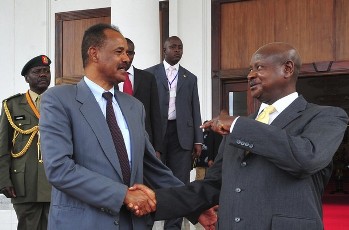Eritrea’s leader attempts to end regional isolation
By Tesfa-Alem Tekle
August 16, 2011 (ADDIS ABABA) – Eritrea’s President Isaias Afwerki is visiting Uganda as the reclusive leader of the Red Sea nation tries to smooth relations with regional leaders in an attempt to end his country’s isolation.

According to a Ugandan presidential statement it is hoped that the Eritrean leader’s visit will boost peace in the Horn of Africa.
Eritrea has long been under fire for allegedly fueling Somalia’s Islamist rebellion and interfering in the internal affairs of other neighboring countries as well as sponsoring terrorist activities in the Horn of Africa.
Last month, leaders of the Inter-Governmental Authority on Development (IGAD ) – which includes Sudan, Ethiopia, Djibouti, Uganda, Kenya, and Somalia – who met in the Ethiopian capital, Addis Ababa made fresh calls to the African Union and United Nations to impose additional sanctions against Eritrea.
Eritrea is already under a UN arms embargo, as well as a travel ban and an assets freeze on its leaders who are accused of breaking an arms blockade on Somalia.
But Asmara denies the allegations and instead accuses Ethiopia, from which it seceded in 1991, of waging an anti-Eritrea campaign. The country’s independence came after a bitter war for self-determination and was followed by a border war with Ethiopia from 1998 to 2000.
“There are serious of allegations that Eritrea is supporting Al-Shabab in destabilizing the Horn of Africa region, and so we will be hoping to hear responses to those issues,” James Mugume, permanent secretary at the Ugandan foreign ministry, told AFP.
“We will be looking at issues on how Eritrea wants to avoid the comprehensive sanctions,” Mugume said.
Eritrea rejoined IGAD last month four years after it walked out in protest at Ethiopia for sending troops to Somalia in 2006 in an attempt to oust Islamist movement Al-Shabab.
Mugume hailed Afwerki’s visit as an important step on the road to Eritrea’s return to the six-member regional body.
Afwerki told the press in Kampala that his visit to Uganda is “a historical opportunity to exchange views on various timely issues”.
“It is an opportunity to come back home again, it is a good feeling. We have only dealt with a few issues and I hope we shall have time to exhaust all the issues. I have learnt a lot from President Museveni and I will listen to him and come to understand of regional issues,” he said.
“We have held a good discussion which we have not finished. We shall have more time for more conclusions. We discussed strategic and political issues in the region and our ministers are developing various bilateral agreements. Apart from the political and security issues, there are other issues of cooperation in the region including in trade, exchange in education, regional flights etc,” he said after his first closed door meeting with president Museveni.
A UN report released in late July accused Eritrea of planning to carry out coordinated terrorist attacks against neighboring countries. It claimed that one target could have been the Africa Union leaders’ summit held in Addis Ababa earlier this year.
The UN Monitoring Group report on Somalia and Eritrea also accused Asmara of using its embassy in Kenya to bankroll the al-Qaeda-linked Somali rebels Al-Shabab who were behind a twin suicide bomb attack on the Ugandan capital last year.
Eritrea analyst Michela Wrong told the BBC Afwerki’s trip was the latest sign that he wanted to end Eritrea’s isolation.
“Eritreans pride themselves on their rugged independence from the world, but I think there is a realization this has reached dangerous levels. They are now regarded as a pariah state,” she said.
(ST)
